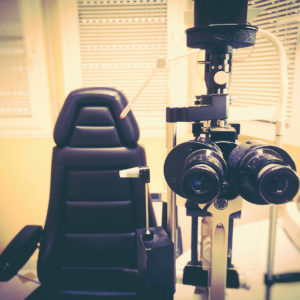Optometry school is full of ups and downs, triumphs and tribulations, and countless impactful events. The most memorable, however, is encountering your very first real patient. When you walk into an exam room and see a stranger sitting in your chair, you realize that it’s not your classmate or family member, and the pressure starts to set in real quick. Every skill you have learned throughout your years in optometry school starts to become a foreign language. Your nerves can make you forget small things like how to adjust a slit lamp or a question to ask during case history. Then after feeling overwhelmed, you step out of the exam room to find your preceptor. And your preceptor begins to criticize everything you just did. You feel a sense of anxiety mixed with doubt. Then when your exam is complete, you escort the patient to the front desk and finally feel a sense of relief that it is over and done with. You reflect back at all of the mistakes you made or things you forgot to do during the exam, or the criticism your preceptor gave you. And at this moment your mind can go two different ways. You can feed yourself negative information and slip into the “imposter syndrome” mindset. Or you can realize that you will mess up, you will get nervous, you will feel overwhelmed, but that is okay.
That “first real patient” experience only makes you a better clinician and a stronger individual. That is just one of many patient encounters you will have. As you continue on, your skill set will improve drastically with more patients. With that being said, those nerves might still be present for the first few patients. You can help calm those nerves, though, by taking a few preparatory steps before seeing your patients. Here’s a small list of things you can do to feel confident before seeing your patients: 
1) PREP THE EXAM ROOM: Right when you get into the exam room, prepare it for patients. Clean all of your equipment and organize your workspace with everything you’re going to need for the exam. It’s important to know where everything is, that way you’re not scrambling for a fixation stick when you need to do a cover test. This helps make the exam run a lot more efficiently. It is also important to know how your room “works.” Before your patient arrives, make sure you know how to use your slit lamp. Familiarize yourself with the knobs, lights, and magnifications as not all slit lamps are set up the same. Know how to work your M&S chart so you aren’t fumbling with buttons while trying to get visual acuity. Taking an extra 10 minutes to set yourself up before the patients come in is a great way to decrease anxiety levels.
2) REVIEW YOUR PATIENTS: Take time to skim over your patients’ charts for the day. Some patients are new so prepare yourself with everything you need to do for a new patient comprehensive exam. Some patients are existing so reviewing their previous exams and case history can give you an idea of what’s to come. Some patients are office visits or Rx checks. Knowing what to expect with these patients can be very helpful to allow you time to think about what the next steps should be. Reviewing your patients’ charts is an excellent way to gain insight of what your exam is going to look like and how to execute it.
 3) KNOW YOUR NOTES: One of the best and most valuable things you can do before even walking into the clinic is to read up on your notes. Reviewing the order of completing the exam and other small steps, such as having the correct working distance for certain tests, is so crucial. Be sure to also review tests you perform outside of a typical comprehensive exam. You’re going to come across ocular health patients such as those with diabetic retinopathy, glaucoma, cataracts, etc. And you will also come across patients who have accommodative insufficiency, convergence excess, etc. So you need to be familiar with how to do a variety of tests on patients who are not your “typical” cases.
3) KNOW YOUR NOTES: One of the best and most valuable things you can do before even walking into the clinic is to read up on your notes. Reviewing the order of completing the exam and other small steps, such as having the correct working distance for certain tests, is so crucial. Be sure to also review tests you perform outside of a typical comprehensive exam. You’re going to come across ocular health patients such as those with diabetic retinopathy, glaucoma, cataracts, etc. And you will also come across patients who have accommodative insufficiency, convergence excess, etc. So you need to be familiar with how to do a variety of tests on patients who are not your “typical” cases.
By preparing yourself to see patients, you can ensure you have smooth and efficient encounters. You can also help relieve yourself of the extra stress and anxiety that comes with lack of preparation. Taking steps like these can boost your confidence and allow you to perform to the best of your ability and give your patients a great experience. Remember, you do know all of these techniques and skills. You have studied and practiced everything. You have been given the privilege to care for real patients because you are a qualified, smart, and exceptional individual. Don’t take what your preceptors say to heart, learn from their constructive criticism and incorporate that into your practice. Soon you will be your own independent doctor and will have your own style in the exam room. And that is why your patients will come back to see you again and again!

